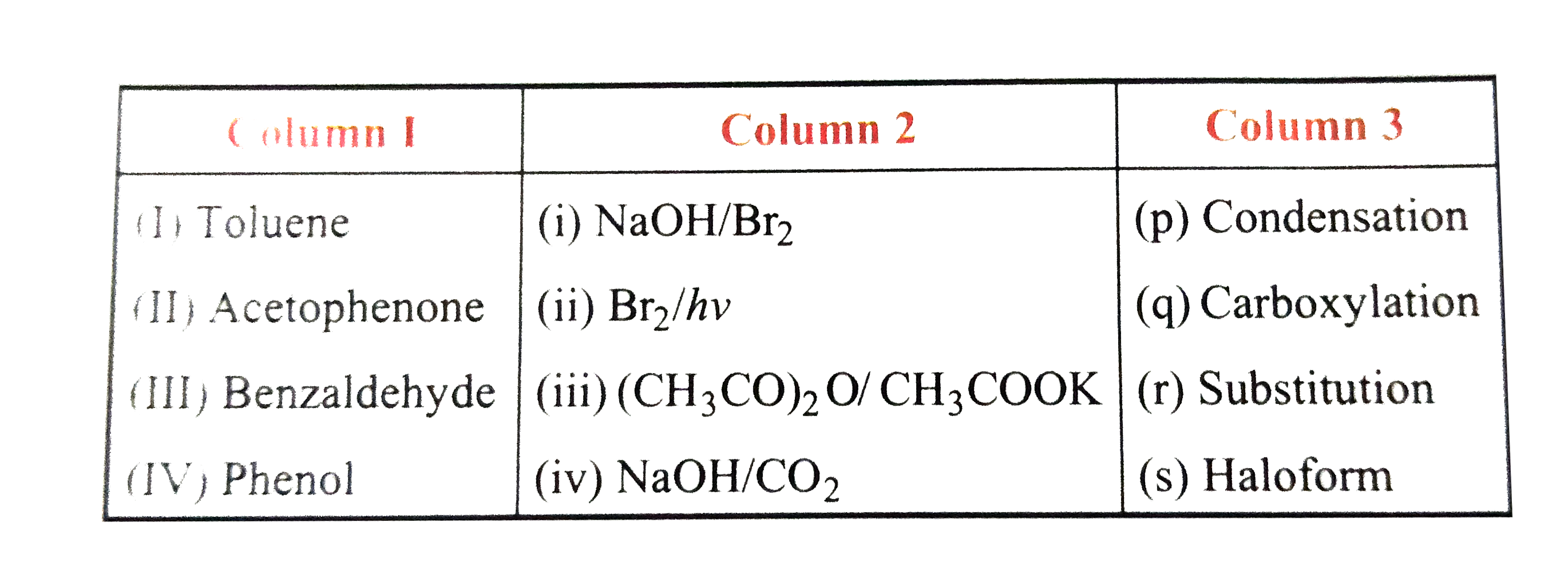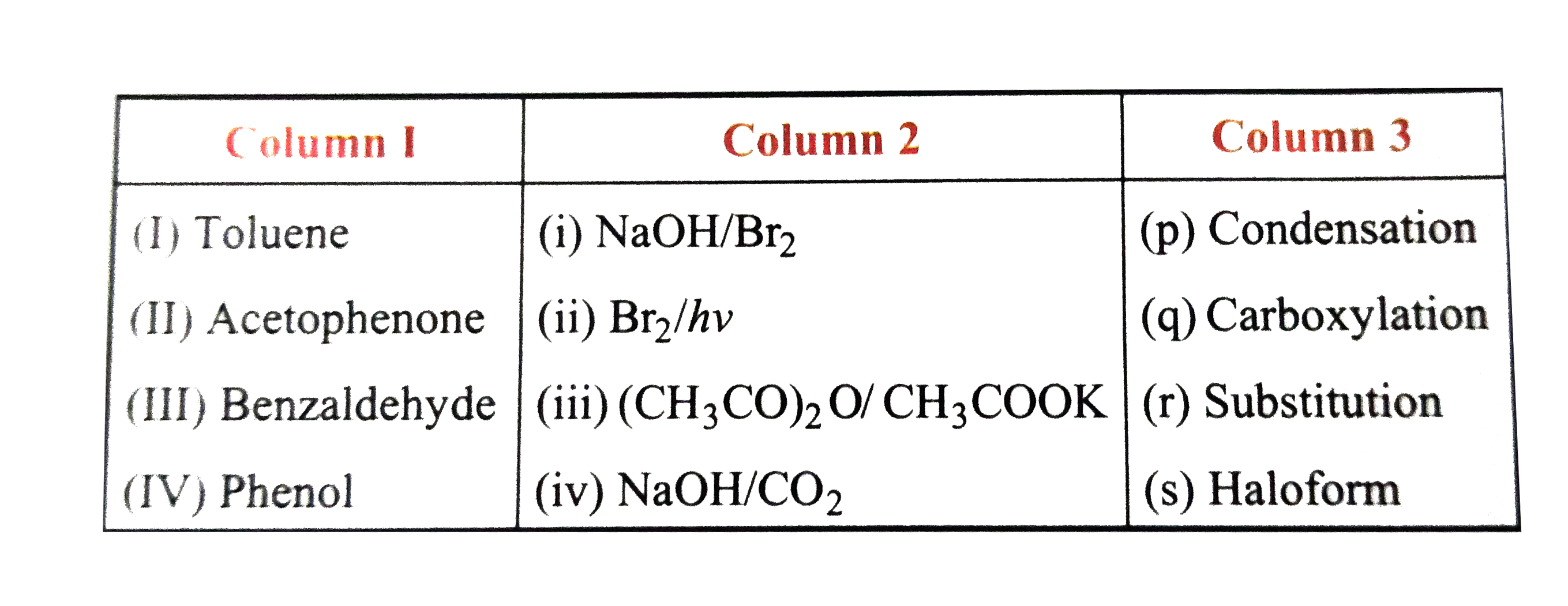columns 1,2, and 3 contain starting materials , reaction conditions and type of reactions , respectively

The only correct combination that gives two different carboxylic acids is
(IV) (iii)(Q)
(I) (i)(S)
(III)(iii)(P)
(II) (iv)(R )
The correct Answer is:C
Topper's Solved these Questions
- BOOK - MODERN PUBLICATIONCHAPTER - ALDEHYDES ,KETONES AND CARBOXYLIC ACIDSEXERCISE - COMPETITION FILE ( OBJECTIVE TYPE QUESTIONS - MULTIPLE CHOICE QUESTIONS (MCQ) ( INTEGER TYPE QUESTIONS )9videos
ALDEHYDES ,KETONES AND CARBOXYLIC ACIDS
- BOOK - MODERN PUBLICATIONCHAPTER - ALDEHYDES ,KETONES AND CARBOXYLIC ACIDSEXERCISE - UNIT PRACTICE TEST13videos
ALDEHYDES ,KETONES AND CARBOXYLIC ACIDS
- BOOK - MODERN PUBLICATIONCHAPTER - ALDEHYDES ,KETONES AND CARBOXYLIC ACIDSEXERCISE - COMPETITION FILE ( OBJECTIVE TYPE QUESTIONS - MULTIPLE CHOICE QUESTIONS (MCQ) ( C. MULTIPLE CHOICE QUESTIONS )10videos
ALDEHYDES ,KETONES AND CARBOXYLIC ACIDS
- BOOK - MODERN PUBLICATIONCHAPTER - ALCOHOLS, PHENOLS AND ETHERSEXERCISE - UNIT PRACTICE TEST (FOR BOARD EXAMINATION)12videos
ALCOHOLS, PHENOLS AND ETHERS
- BOOK - MODERN PUBLICATIONCHAPTER - BIOMOLECULESEXERCISE - UNIT PRACTICE TEST FOR BOARD EXAMINATION13videos
BIOMOLECULES
Similar Questions
Column 1,2 and 3 contain starting materials, reaction conditions, and type of reactions, respectively

The only CORRECT combination that gives two different carboxylic acid isView SolutionColumn 1,2 and 3 contain starting materials, reaction conditions, and type of reactions, respectively

For the synthesis of benzoic acid, the only CORRECT combination isView Solution
Knowledge Check
- Question 1 - Select One
Column 1,2 and 3 contain starting materials, reaction conditions, and type of reactions, respectively

The only CORRECT combination that gives two different carboxylic acid isA(IV)(ii)(Q)B(II)(iv)(R)C(I)(i)(S)D(III)(iii)(P) - Question 2 - Select One

The only CORRECT combination that given two different
carboxylic acids isA(IV)(i)(Q)B(II)(ii)(R)C(I)(iii)(s)D(III)(iii)(Q) - Question 3 - Select One
Match the following :
Answer the following qeustions by appropriately matching the information given in the three columns of the following table.
Columns, 1,2 and 3 containing starting materials, reaction conditions and type of reactions, respectively.
The only correct combination in which the reaction proceeds through radical mechanism is :A(I),(ii),(r)B(II),(iii),(s)C(III),(ii),(p)D(IV),(i),(s)
Column 1,2 and 3 contain starting materials, reaction conditions, and type of reactions, respectively

For the synthesis of benzoic acid, the only CORRECT combination isView SolutionMatch the following :
Answer the following qeustions by appropriately matching the information given in the three columns of the following table.
Columns, 1,2 and 3 containing starting materials, reaction conditions and type of reactions, respectively.
For the synthesis of benzoic acid, the only correct combination is :View SolutionColumns 1,2 and 3 contain starting materials, reaction conditions, and type of reactions, respectively.
Column 1
(I) Toluene
(II) Acetophenone
(III) Benzaldehyde
(IV) Phenol
Column 2
(i)NaOH/Br2
(ii)Br2/hv
(iii)(CH3CO)2O/CHCOOK
(iv)NaOH/CO2
Column 3
(P) Condensation
(Q) Carboxylation
(R) Substitution
(S) Haloform
The only CORRECT combination that gives two different carboxylic acids isView SolutionColumns 1,2 and 3 contain starting materials, reaction conditions, and type of reactions, respectively.
Column 1
(I) Toluene
(II) Acetophenone
(III) Benzaldehyde
(IV) Phenol
Column 2
(i)NaOH/Br2
(ii)Br2/hv
(iii)(CH3CO)2O/CHCOOK
(iv)NaOH/CO2
Column 3
(P) Condensation
(Q) Carboxylation
(R) Substitution
(S) Haloform
For the synthesis of benzoic acid, the only CORRECT combination isView SolutionColumns 1,2 and 3 contain starting materials, reaction conditions, and type of reactions, respectively.
Column 1
(I) Toluene
(II) Acetophenone
(III) Benzaldehyde
(IV) Phenol
Column 2
(i)NaOH/Br2
(ii)Br2/hv
(iii)(CH3CO)2O/CHCOOK
(iv)NaOH/CO2
Column 3
(P) Condensation
(Q) Carboxylation
(R) Substitution
(S) Haloform
The only CORRECT combination in which the reaction proceeds through radical mechanism isView Solution

